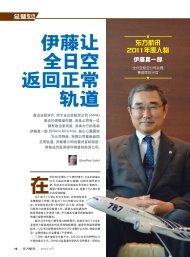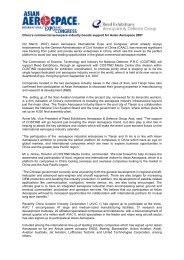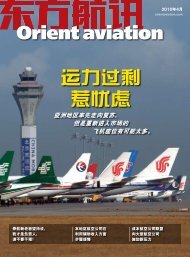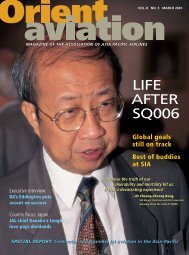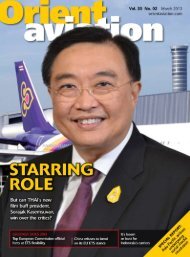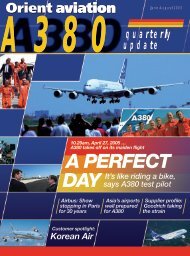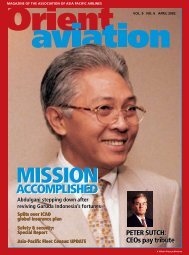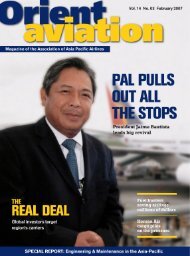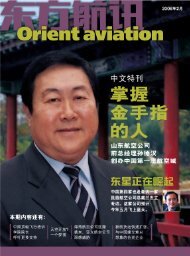China's - Orient Aviation
China's - Orient Aviation
China's - Orient Aviation
- No tags were found...
Create successful ePaper yourself
Turn your PDF publications into a flip-book with our unique Google optimized e-Paper software.
ENVIRONMENTNEWSchallenge we face in moving towards abroader post-Kyoto policy consensus,” hesaid.Herdman said the Asia-Pacific is hometo two thirds of the world’s population,representing 26% of global GDP and aviationwas widely recognised as a key contributor tosuccessful economic and social development,helping to raise living standards and alleviatepoverty.“Asia - Pacif ic airlines take theirenvironmental responsibilities very seriouslyand we are committed to playing an activerole in developing effective policies toaddress these important issues,” he said.Bisignani was similarly blunt. “Europe’sunilateral approach to emissions tradingconfuses taking leadership with takingcash.“It is disappointing and irresponsible.Regional schemes will have, at best, limitedimpact on the environment. And theirunilateral application to foreign airlines is aclear breach of the Chicago Convention. Theresulting trade and legal battles will distractgovernments from making real progress.”ATA’s May said European states hadindicated their intent to unilaterally imposesuch measures on the airlines from othercountries contrary to the will of everyother country in the world and contrary tointernational law.“If they persist there will, no doubt, be alegal battle. It is our hope that this one area ofdisagreement will not detract from the broadagreement obtained on all other aspects ofICAO’s comprehensive plan,” ATA said.ICAO’s new Group on International<strong>Aviation</strong> and Climate Change has beentasked to formulate an “implementationframework” consisting of strategies andmeasures that its member states can use toachieve emissions reductions. It will identifyfuel efficiency goals and means of measuringprogress.Options to be considered includevoluntary measures, technological advancesin both aircraft and ground-based equipment,more efficient operational measures,improvements in air traffic management,positive economic incentives and marketbasedmeasures.‘ICAO’s record is simply notgood enough’Jacques BarrotTransport CommissionerEuropean Union>>>>>>>>>>>>>>>>>>>Lifting of EU’s Garudaban threatenedBy Tom BallantyneGa r u d aI n d o n e s i asuffered asetback in itscampaign tohave an European Union(EU) ban on the carrier flyingto Europe reversed after anofficial report blamed thecrash of a Gar uda B737-400 on cockpit error. Theairliner, flying from Jakartato Jogyakarta on March 7,crashed landed at the city’sairport and burst into flames,killing 21 passengers and crew.The pilot and co-pilot wereamong the 112 survivors.The Indonesian National TransportSafety Commission said in its report,released in October, that the aircraft’s pilotignored a ground proximity warning systemthat had sounded 15 times as he approachedthe runway at almost twice the recommendedlanding speed. The investigators said thepilot should have initiated “a go around”and made a second landing approach. Theyalso said he had ignored calls by the co-pilotto “go around”.In September, the international flagcarrier’s president, Emirsyah Satyr, said thecarrier had its sights set on the EU ban onGaruda flights being lifted, especially as theairline was seriously considering reinstatingthe Jakarta-Schiphol service. Earlier thisyear, the EU imposed a blanket ban onall Indonesian airlines flying into Europefollowing three recent fatal air crashes byIndonesian airlines. Garuda argued that itshould not have been included in the blanketban despite the March crash. At the same,the airline was undergoing the InternationalAir Transport Association (IATA) globallyrecognised operational safety audit (IOSA).At press time, an IATA spokesman said:“Garuda is still not on the IOSA Registry atthis point in time.”Satar also disclosed a major f leetmodernization by thecarrier. It is looking atbuying 25 B737-800s nextyear and hopes to have10 B787 Dreamliners inoperation by 2011.In August, it reporteda net profit of US$15.9million for the first sixmonths of the year, endedJune 30.The result comparedto a $38.8 million loss inthe same period in 2006.Garuda had forecast amodest profit of around $5million this year – the firstpositive result in four years– but Satar is confident theairline will exceed this.Gar uda had planned to ret urn toAmsterdam – it stopped flying the route in2004 for financial reasons – when the shockEC flight ban was imposed, apparently theresult of several air accidents in Indonesiain the past two years.A n Indonesian gover nment teamtravelled to Brussels in September to speakto EC officials about the ban. Anothermeeting between an Indonesian delegationand EC officials took place in Montrealin late September on the sidelines of theInternational Civil <strong>Aviation</strong> Organization(ICAO) general assembly.During the meeting Indonesia clarifieddetails of aviation safety documentsrequested by the Europeans and presentedthe country’s plan to achieve a zero accidentssafety rate as well as a new policy for localairlines’ safety compliance ratings.One route that soon will be re-opened isDenpasar-Nagoya, closed down two yearsago when Japanese traffic dropped offfollowing a number of terrorist bombingsin Bali. Garuda plans to revive the flights inJune next year using A330s.The airline believes there is also bigpotential for cargo business on the route. Italso flies from Denpasar to Osaka and fromJakarta to Tokyo via Denpasar.‘The EC has no moregrounds for barring us’Emirsyah SatarPresidentGaruda Indonesia>>>>>>>>>>>>>>36 ORIENT AVIATION NOVEMBER 2007




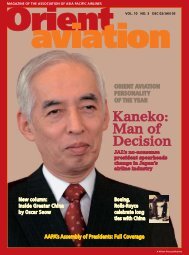
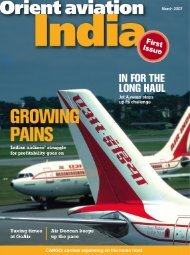
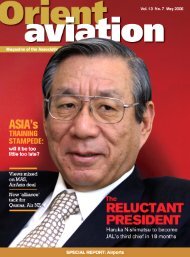
![OAMag-V7N4-Cover [Converted] - Orient Aviation](https://img.yumpu.com/48598575/1/190x255/oamag-v7n4-cover-converted-orient-aviation.jpg?quality=85)
